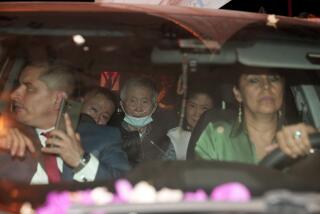Peace Bid Said to Demoralize Rebels : Peru: ‘Massive desertions’ from Maoist group are reported. But independent analysts urge caution on figures.
- Share via
LIMA, Peru — President Alberto Fujimori says that calls for peace negotiations by Abimael Guzman, the imprisoned leader of Sendero Luminoso, have demoralized the Maoist guerrilla organization and led to “massive desertions.”
Guzman’s surprisingly conciliatory and widely publicized gesture after a year in prison “first caused confusion, then demoralization and finally, in several places, abandonment of Sendero ranks,” Fujimori said in an interview late Wednesday.
He said that about 280 members of Sendero Luminoso (Shining Path) had surrendered to authorities so far as a result of the once-uncompromising leader’s proposals for peace talks, which were made public in October.
“Never before had mass desertions by Senderistas been seen,” Fujimori added. He gave no further details.
Independent analysts said reports of Sendero desertions should be interpreted with caution because many people turning themselves in may not be adamant guerrilla fighters but rather residents of communities controlled by guerrillas, and the numbers may be exaggerated by local police and military officials.
“You have to look at them case by case,” said Pablo Rojas, head of a Peruvian human rights group.
Still, Rojas agreed that Sendero Luminoso is in a state of disarray and that at least some desertions have taken place.
In mid-1992, Sendero car bombs and other attacks appeared to have the government on the defensive. The country was demoralized after 12 years of bloody war with a death toll of more than 25,000. Guzman’s Maoist zealots showed no sign of relenting in their ruthless struggle for power.
But since the capture of Guzman and other top leaders in September, 1992, Sendero Luminoso has been in sharp decline. And the government has carefully kept Guzman abreast of his organization’s problems, Fujimori told The Times.
“Contact with Abimael Guzman has been maintained constantly, giving him information about what has been happening with Sendero, about advances by the government and also talking about this possibility of abandoning his war because it hasn’t been successful,” the president said.
In October, the government aired videotapes that showed Guzman, 58, reading letters calling for peace negotiations.
“We must struggle for a peace accord,” he said, recognizing “real successes” by the government.
Fujimori has rejected Guzman’s proposal for negotiations.
“In reality, there was no need to negotiate, in the first place; and in the second place . . . it is a terrorist group,” the president said in the interview, “and I think no country would negotiate with a terrorist group.”
*
He has called instead for a unilateral cease-fire by Sendero Luminoso. So far, there has been no rebel response, other than a recent rash of terrorist bombings.
Fujimori said the government applied no pressure and gave nothing in return for Guzman’s conciliatory letters. He said reports that authorities allowed Guzman conjugal visits with Elena Iparraguirre, his imprisoned lover and second in command, are “totally false.”
He suggested that the Spartan conditions of Guzman’s isolated cell on a naval base near Lima may have helped persuade the once-intransigent rebel to sue for peace.
More to Read
Sign up for Essential California
The most important California stories and recommendations in your inbox every morning.
You may occasionally receive promotional content from the Los Angeles Times.













